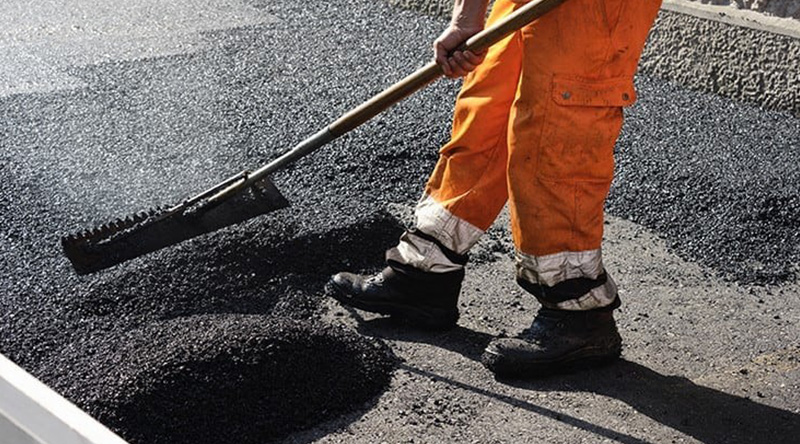Hot Mix Asphalt Paving: The Secret to Smooth, Angled Parking Lot Surfaces
Hot Mix Asphalt Paving: The Secret to Smooth, Angled Parking Lot Surfaces
Blog Article
Discovering the Environmental Advantages of Hot Mix Asphalt
The application of Hot Mix Asphalt in infrastructure jobs offers an engaging situation for lasting development and environmental stewardship. By delving right into the complex information of its manufacturing procedures and the ingenious usage of recycled materials, a much deeper understanding arises of how this innovation exceeds simple surface area applications. The environmental advantages of Hot Mix Asphalt extend much past initial impacts, using a nuanced viewpoint on just how this product can pave the means for a greener future.

Decreased Greenhouse Gas Emissions
Hot Mix Asphalt production provides a considerable decrease in greenhouse gas emissions contrasted to various other sidewalk materials. The manufacturing procedure of Warm Mix Asphalt entails warming the combination of aggregate and asphalt binder to high temperature levels. This procedure calls for much less power contrasted to the manufacturing of different sidewalk materials, leading to reduced greenhouse gas discharges. Additionally, making use of recycled products in Warm Mix Asphalt better adds to lowering its ecological impact. By including reclaimed asphalt pavement and recycled asphalt shingles right into the mix, the need for virgin materials is decreased, bring about power savings and lowered discharges related to extraction and processing.
Researches have actually revealed that Warm Mix Asphalt pavements have a smaller carbon impact over their life process contrasted to various other pavement alternatives. The sturdiness and recyclability of Warm Mix Asphalt even more improve its environmental advantages by minimizing the demand for regular upkeep or substitute, thus preserving resources and reducing discharges linked with reconstruction tasks.
Energy Effectiveness and Preservation
The manufacturing procedure of Warm Mix Asphalt not only minimizes greenhouse gas discharges but also contributes significantly to power efficiency and conservation efforts. Power effectiveness is an essential advantage of Warm Mix Asphalt manufacturing contrasted to various other pavement types. The toughness of Hot Mix Asphalt minimizes the regularity of upkeep and repair, leading to long-term power cost savings.
Sustainable Pavement Solutions

One secret aspect of sustainable sidewalk solutions is the use of recycled materials such as redeemed asphalt pavement (RAP) and recycled asphalt roof shingles (RAS) By integrating these products right into the asphalt blends, the demand for virgin sources is decreased, causing reduced power usage and greenhouse gas discharges during production. Additionally, the reuse of these products aids divert waste from landfills, adding to a more sustainable and round economic situation.
Additionally, lasting sidewalk services concentrate on maximizing pavement style to improve performance and longevity. Techniques such as cozy mix asphalt (WMA) and rock mastic asphalt (SMA) improve the sturdiness and durability of sidewalks, lowering the demand for constant repairs and replacements. By applying these cutting-edge techniques, infrastructure developers can develop pavements that not only satisfy high-performance requirements but additionally decrease their environmental footprint.
Minimized Environmental Impact
With an emphasis on sustainability and eco-conscious practices, sidewalk services are made to reduce the environmental effect of construction and maintenance processes. Warm mix asphalt, specifically, provides several advantages that add to lowering the overall ecological impact of roadway framework. One crucial aspect is the recyclability of asphalt, which can be reused multiple times without endangering its high quality. This characteristic helps in conserving natural deposits and lowering the quantity of waste sent to garbage dumps.
In addition, the production of hot mix asphalt sends out reduced degrees of greenhouse gases compared to other sidewalk products, making it a more eco-friendly alternative. The power performance of asphalt plants has actually also enhanced over the years, causing minimized gas usage and reduced discharges. In addition, the smooth surface area of hot mix asphalt reduces rolling resistance for automobiles, resulting in reduced gas intake and reduced air contamination from car discharges.
Contribution to Climate Adjustment Reduction
Hot mix asphalt plays an essential role in mitigating environment change with its sustainable homes and minimized ecological effect. One substantial contribution to climate modification reduction originates from the energy efficiency of warm mix asphalt manufacturing. Compared to other sidewalk choices, the manufacturing process for warm mix asphalt takes in much less energy and releases reduced hot mix asphalt levels of greenhouse gases, hence reducing its general carbon impact.
Additionally, hot mix asphalt's ability to show sunshine, called albedo, assists in reducing metropolitan heat island effects. By lessening warm absorption and retention, hot mix asphalt sidewalks can reduce the demand for cooling in city locations, as a result reducing greenhouse gas discharges related to power usage for cooling objectives.
Additionally, the resilience and recyclability of hot mix asphalt further improve its environment change reduction capacities. Regrading. The long life-span of asphalt sidewalks decreases the requirement for frequent repair work or replacements, ultimately reducing the carbon discharges linked to roadway maintenance tasks. The recyclability of asphalt materials lessens the demand for virgin sources and lowers the environmental influence of pavement building, aligning with sustainable practices for climate modification mitigation.
Verdict
In conclusion, the ecological benefits of Warm Mix Asphalt show its substantial contribution to decreasing greenhouse gas exhausts, preserving energy, and decreasing environmental influence. This lasting sidewalk service lines up with environment change reduction initiatives, promotes resource preservation, and boosts framework development. By making use of recycled products, energy-efficient manufacturing processes, and sturdy style, Hot Mix Asphalt plays an important function in fostering a much more eco-friendly strategy to infrastructure building.
The manufacturing process of Hot Mix Asphalt entails warming the mix of aggregate and asphalt binder to high temperatures. By integrating reclaimed asphalt sidewalk and recycled asphalt roof shingles right into the mix, the need for virgin materials is minimized, leading to power cost savings and decreased exhausts associated with removal and processing.
One key aspect of sustainable pavement options is the usage of recycled products such as recovered asphalt pavement (RAP) and recycled asphalt tiles (RAS) Techniques such as warm mix asphalt (WMA) and rock mastic asphalt (SMA) boost the longevity and resilience of pavements, lowering the need for frequent repair services and replacements. Compared to various other sidewalk alternatives, the manufacturing procedure for warm mix asphalt takes in less power and discharges lower levels of greenhouse gases, thus decreasing its overall carbon impact.
Report this page